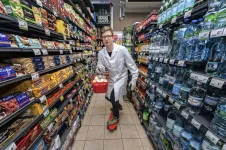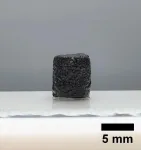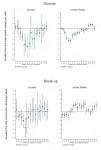(Press-News.org) Approximately 8 out of every 10 health professionals in Spain are willing to be vaccinated against COVID-19, according to a study led by researchers from the Universitat Oberta de Catalunya (UOC). Published in the open-access journal Vaccines, the study assessed for the first time this population segment's willingness to be vaccinated against SARS-CoV-2 and concluded that the level of acceptance is higher among physicians than among nursing staff. Among the reasons given by health personnel for not wanting to be immunized, fears about the vaccines' safety and the potential side effects stood out.
Although vaccination is considered to the most effective method for preventing and eradicating viral infections and stopping their transmission, a significant percentage of the population is sceptical about the role played by these preventive drugs in immunity. One of the consequences of this has been a drop in the number of vaccinated people, leading to outbreaks of diseases that were controlled or even eradicated, such as measles. In fact, the growth of anti-vaccine groups led the World Health Organization (WHO) to include resistance to vaccination as one of the 10 global threats of 2019.
One of the main channels for propagating fake or scientifically unfounded information against vaccines are social media, including Instagram, Facebook, TikTok, Telegram and Twitter. In view of this, the researchers, led by Hans Eguia, a doctoral student enrolled on the UOC's doctoral programme in Health and Psychology, recruited 1,002 volunteers from Twitter between 10 September and 23 November 2020, most of them healthcare workers, and asked them to complete a questionnaire in which they were asked whether or not they would accept the vaccine and why.
Of the 731 people who were Spanish, 164 answered that they would not receive the vaccine. Of these, 17.5% were physicians, 35% were nursing staff and 31.5% were other healthcare professionals. Among the main reasons given for not vaccinating, they mentioned concerns about a possible lack of effectiveness, a lack of safety and possible adverse side effects.
"It is an extraordinary thing that the vaccines have been developed in less than a year. This has never happened before and it may give grounds for scepticism, even among some health professionals," explained Francesc Saigí, professor of Health Sciences at the UOC and a researcher at the I2TIC research group, which led the study.
"However, we can be sure that all the approved vaccines are safe. The fact that they been developed in such a short time is because they have received an enormous amount of resources. The criteria applied by the regulatory agencies in approving medicines are very strict," he added.
The results were obtained when the second wave was just starting in Spain and the vaccines' phase III clinical trials had not yet been completed. "There were no data and this perhaps might explain why some health professionals preferred to wait until more information was available. Perhaps if we repeated the survey today, the results would be different," suggested Marina Bosque, a researcher at the GRESP research group (University of Manresa, UOC).
The paper's authors consider that the fact that twice as many nursing staff as medical staff were unwilling to be vaccinated is worrying, because "they are the people who are closest to the patients and, therefore, more likely to influence their opinion, as is already the case in the flu vaccination campaigns," Saigí observed.
Although the study was carried out with a small sample before vaccination started, the authors believe that the results are a warning bell that shows that more interventions are needed to improve communication with the public in general and with health professionals in particular. Previous studies have shown that when people have doubts about vaccines, the reluctance diminishes and tends to disappear if they are given clear, powerful messages. A second study is in progress to determine the opinion and willingness to be vaccinated among the general population and health professionals, now that the vaccination process is in full swing.
"By understanding the reasons why people do not want to be vaccinated, especially health personnel, it will be possible to design communication and education strategies and even use social media to settle doubts, improve the vaccination rate and, ultimately, achieve the desired herd immunity effect," the authors concluded.
INFORMATION:
This UOC research supports Sustainable Development Goals (SDGs) 3, on good health and well-being, and 10, on reduced inequality.
Reference paper:
Eguia, H.; Vinciarelli, F.; Bosque-Prous, M. et al. (2021). "Spain's Hesitation at the Gates of a COVID-19 Vaccine". Vaccines 9, 170.
https://doi.org/10.3390/vaccines9020170
UOC R&I
The UOC's research and innovation (R&I) is helping overcome pressing challenges faced by global societies in the 21st century, by studying interactions between technology and human & social sciences with a specific focus on the network society, e-learning and e-health. Over 500 researchers and 51 research groups work among the University's seven faculties and two research centres: the Internet Interdisciplinary Institute (IN3) and the eHealth Center (eHC).
The United Nations' 2030 Agenda for Sustainable Development and open knowledge serve as strategic pillars for the UOC's teaching, research and innovation. More information:research.uoc.edu. #UOC25years
The risk of being bullied at work is twice as high if you were born abroad. And if you come from a culture that is culturally dissimilar to Sweden's, the risk is even higher. These are the results of a Swedish study from Linköping University that was recently published in The International Journal of Human Resource Management.
Employers in Sweden have a duty to ensure that the workplace is safe, with a healthy atmosphere. Despite this, some employees are treated poorly, excluded and ignored. When such treatment has continued for a longer period, it is defined as bullying.
Researchers at Linköping University wanted to see if people born abroad run a greater risk of being bullied at work.
"Our results show an increased risk of bullying ...
The headquarter of a eukaryotic cell is the nucleus, and most of the cell's information and instructions are stored there in the form of DNA (Deoxyribonucleic acid). The DNA, which is twisted, rolled and bundled two-meter-long chain, together with protein molecules, makes up the chromatin fiber that lays inside the nucleus. For years, scientists were curious how these components are organized. How is it possible that proteins necessary in biochemical reactions move efficiently within the nucleus full of DNA? Recent studies have finally solved the mystery. Findings describing it in detail were published in the Journal of Physical Chemistry Letters on December 21st, 2020.
Molecules ...
Stay tuned for the hottest science in the prevention of heart disease at ESC Preventive Cardiology 2021, an online scientific congress of the European Society of Cardiology (ESC). The annual congress of the European Association of Preventive Cardiology (EAPC), a branch of the ESC, takes place 15 to 17 April online.
Preventive cardiology covers how to avoid first and subsequent heart attacks and strokes. It also includes sports cardiology, primary care, epidemiology and population science, basic and translational research, and rehabilitation after an event. Explore the scientific programme.
Novel research will be presented including new insights into the connections between diet, exercise, and cardiovascular health. How does shift work affect the body? And are there links between climate ...
Solar energy is a clean, renewable source of electricity that could potentially play a significant part in fulfilling the world's energy requirements, but there are still some challenges to fully capitalizing on this potential. Researchers looked into some of the issues that hamper the uptake of solar energy and proposed different policies to encourage the use of this technology.
Installing solar panels to offset energy costs and reduce the environmental impact of their homes has been gaining popularity with homeowners in recent years. On a global scale, an increasing number of countries are similarly encouraging the installation of solar photovoltaics ...
CHAMPAIGN, Ill. -- A camera-trap study in the Mendocino National Forest in Northern California reveals that black bears are adept at finding and stealing the remains of adult deer killed by pumas. This "kleptoparasitism" by bears, as scientists call it, reduces the calories pumas consume in seasons when the bears are most active. Perhaps in response to this shortage, the pumas hunt more often and eat more small game when the bears are not in hibernation.
The findings are published in the journal Basic and Applied Ecology.
Pumas, also known as mountain lions or cougars, are apex ...
Due to their tissue-like mechanical properties, hydrogels are being increasingly used for biomedical applications; a well-known example are soft contact lenses. These gel-like polymers consist of 90 percent water, are elastic and particularly biocompatible. Hydrogels that are also electrically conductive allow additional fields of application, for example in the transmission of electrical signals in the body or as sensors. An interdisciplinary research team of the Research Training Group (RTG) 2154 "Materials for Brain" at Kiel University (CAU) has now developed a method to produce hydrogels with an excellent level of electrical conductivity. What makes this method special is that the mechanical properties of ...
Google Trends reveal how searches related to family and relationship behaviors, such as weddings, contraception, and abortions, changed during lockdowns in the US and Europe.
INFORMATION:
Link to publicly available article: https://journals.plos.org/plosone/article?id=10.1371/journal.pone.0248072
Funding: The authors received no specific funding for this work.
Competing Interests: The authors have declared that no competing interests exist.
Article URL: https://journals.plos.org/plosone/article?id=10.1371/journal.pone.0248072
...
How did life begin on Earth and could it exist elsewhere? Researchers at Simon Fraser University have isolated a genetic clue--an enzyme known as an RNA polymerase--that provides new insights about the origins of life. The research is published today in the journal Science.
Researchers in SFU molecular biology and biochemistry professor Peter Unrau's laboratory are working to advance the RNA World Hypothesis in answer to fundamental questions on life's beginnings.
The hypothesis suggests that life on our planet began with self-replicating ribonucleic acid (RNA) molecules, capable of not only carrying genetic information but also driving chemical reactions essential for life, prior to the evolution ...
In the future, droughts could be even more severe than those that struck parts of Germany in 2018. An analysis of climate data from the last millennium shows that several factors have to coincide to produce a megadrought: not only rising temperatures, but also the amount of solar radiation, as well as certain meteorological and ocean-circulation conditions in the North Atlantic, like those expected to arise in the future. A group of researchers led by the Alfred Wegener Institute have just released their findings in the journal Communications Earth & Environment.
Despite the precipitation this winter, which in ...
Large areas of forests regrowing in the Amazon to help reduce carbon dioxide in the atmosphere, are being limited by climate and human activity.
The forests, which naturally regrow on land previously deforested for agriculture and now abandoned, are developing at different speeds. Researchers at the University of Bristol have found a link between slower tree-growth and land previously scorched by fire.
The findings were published today [date] in Nature Communications, and suggest a need for a better protection of these forests if they are to help mitigate the effects of climate change.
Global forests are expected to contribute a quarter of pledged mitigation under the ...







